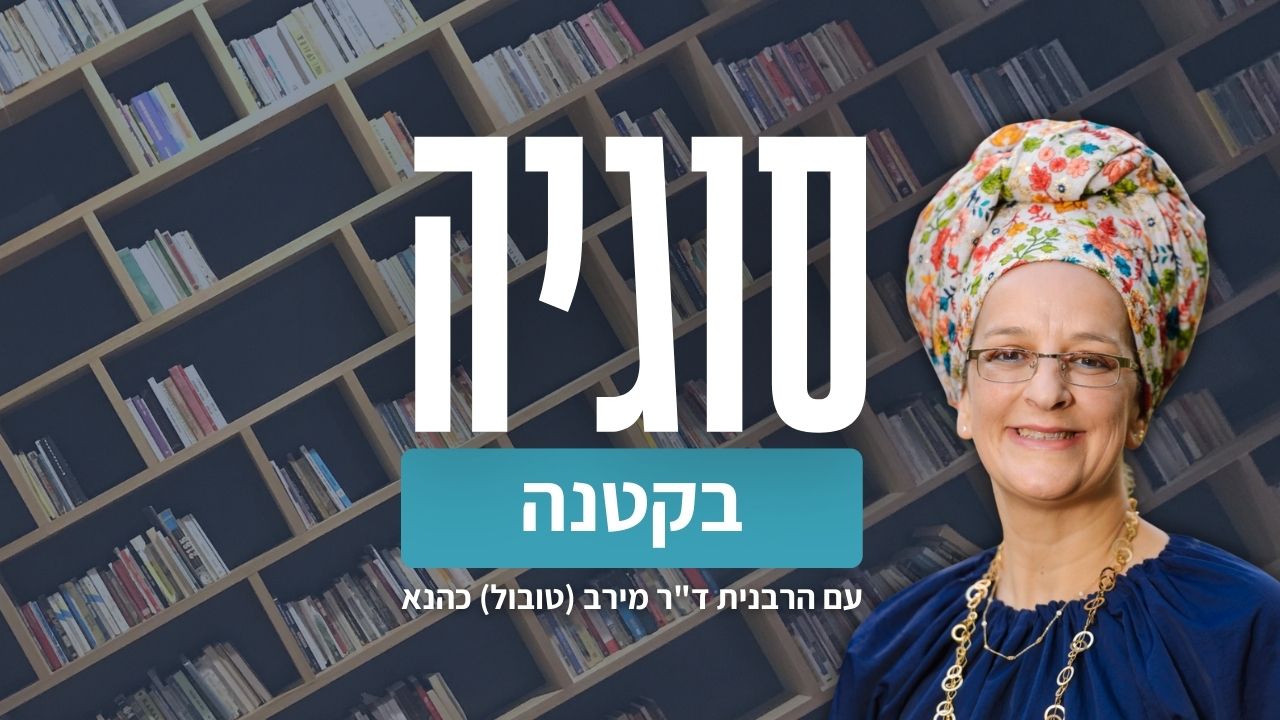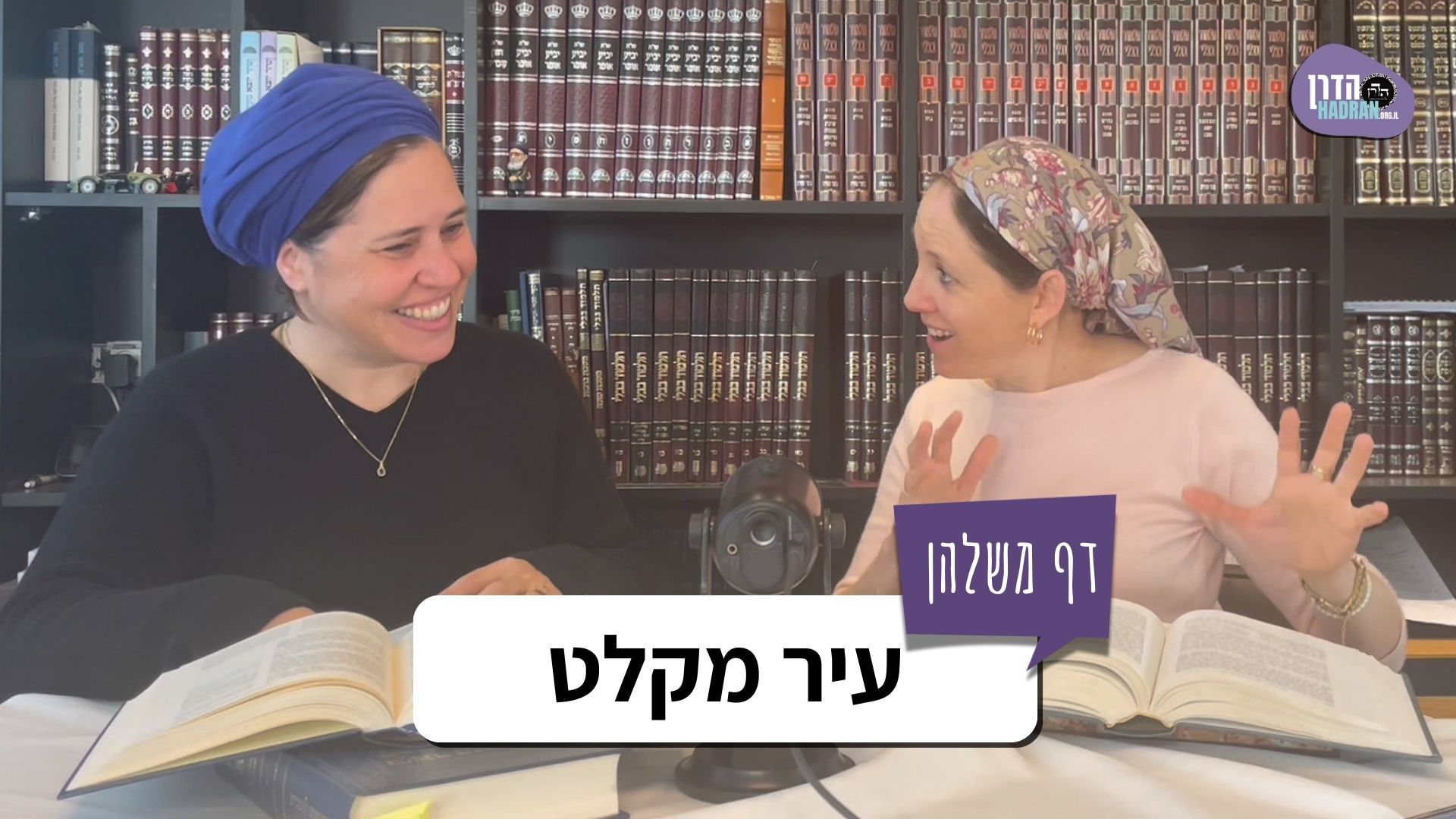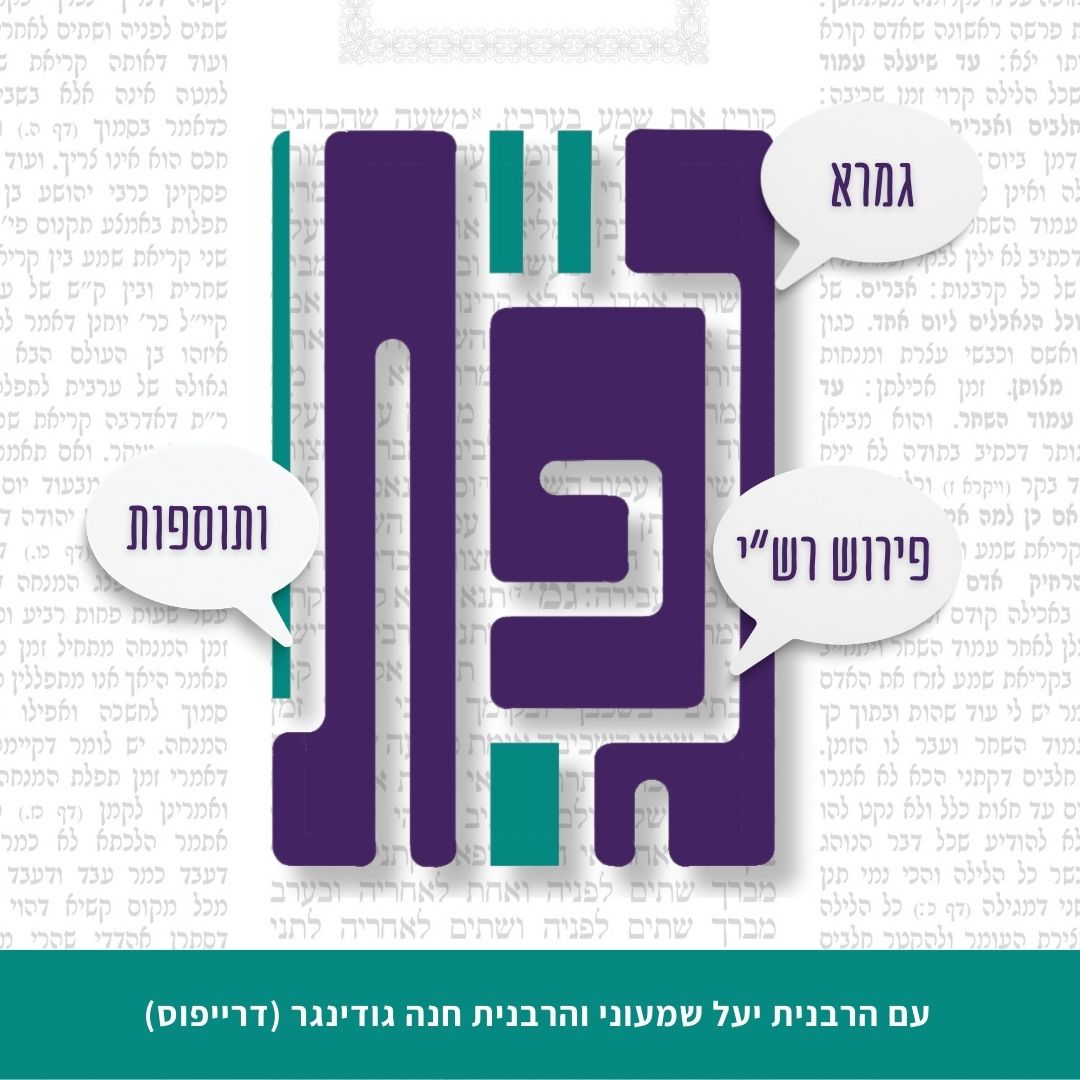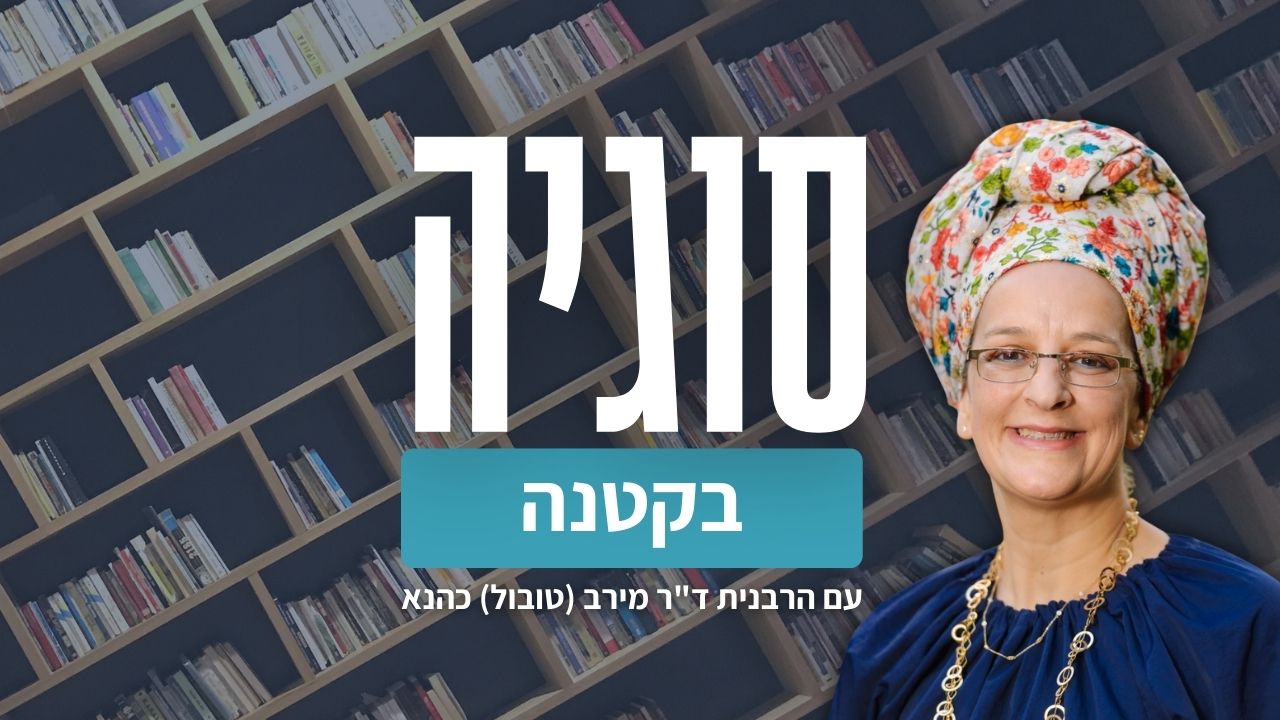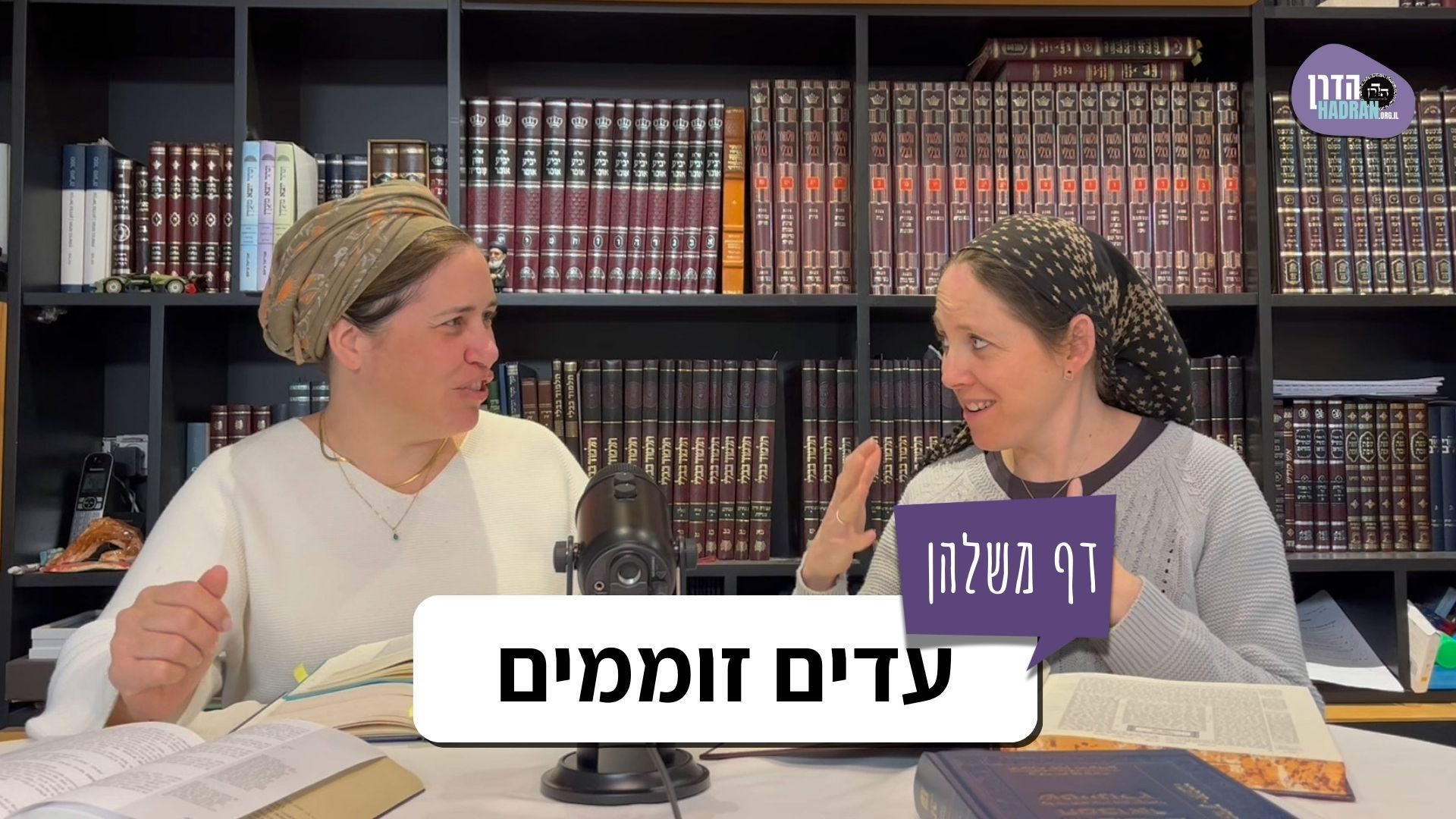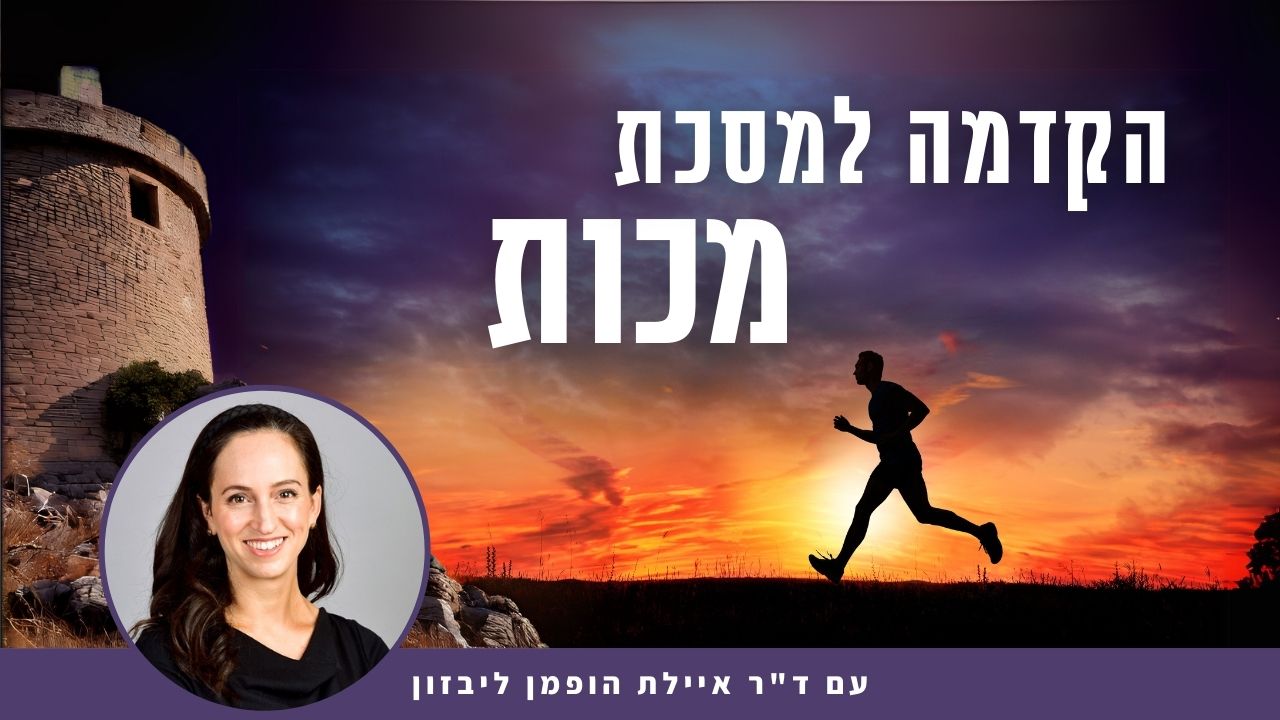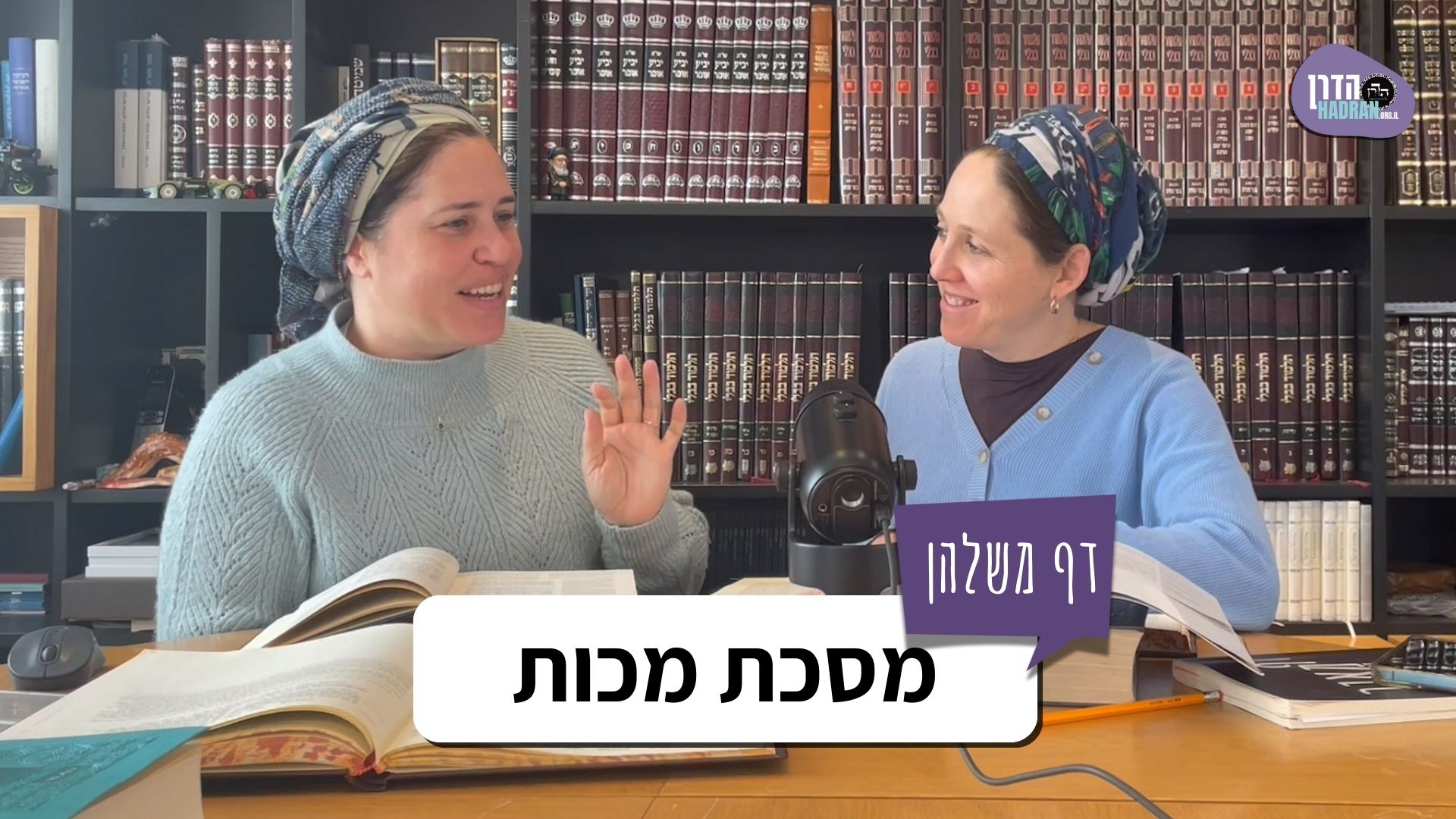הלימוד החודש מוקדש לרפואת פיליס הכט, גיטל פעשא בת מאשה רחל על ידי חברותיה הרבות שאוהבות ומעריכות אותה.
רוצה להקדיש שיעור?

כלים
הלימוד החודש מוקדש לרפואת פיליס הכט, גיטל פעשא בת מאשה רחל על ידי חברותיה הרבות שאוהבות ומעריכות אותה.
כלים
העמקה
רוצה להבין מה באמת קורה מתחת לפני השטח של הסוגיה?
שיעורים, פודקאסטים והרחבות של מיטב המורות שלנו יפתחו לך עוד זוויות וכיווני חשיבה.
חדשה בלימוד הגמרא?
זה הדף הראשון שלך? איזו התרגשות עצומה! יש לנו בדיוק את התכנים והכלים שיעזרו לך לעשות את הצעדים הראשונים ללמידה בקצב וברמה שלך, כך תוכלי להרגיש בנוח גם בתוך הסוגיות המורכבות ומאתגרות.
פסיפס הלומדות שלנו
גלי את קהילת הלומדות שלנו, מגוון נשים, רקעים וסיפורים. כולן חלק מתנועה ומסע מרגש ועוצמתי.
מכות ו
אָמַר רַבִּי יוֹסֵי: בַּמֶּה דְּבָרִים אֲמוּרִים – בְּדִינֵי נְפָשׁוֹת, אֲבָל בְּדִינֵי מָמוֹנוֹת – תִּתְקַיֵּים הָעֵדוּת בַּשְּׁאָר. רַבִּי אוֹמֵר: אֶחָד דִּינֵי מָמוֹנוֹת וְאֶחָד דִּינֵי נְפָשׁוֹת.
Rabbi Yosei says: In what case is this statement, that if one of the three witnesses is disqualified the entire testimony is voided, said? It is said with regard to cases of capital law, which are adjudicated stringently. But with regard to cases of monetary law, which are adjudicated more leniently, even if one of the witnesses is disqualified, the testimony will be validated with the testimony of the rest of the witnesses, and if it is sufficient the case can be adjudicated on that basis. Rabbi Yehuda HaNasi disagrees and says: If one of the three witnesses is disqualified the entire testimony is voided in both cases of monetary law and cases of capital law.
וְאֵימָתַי – בִּזְמַן שֶׁהִתְרוּ בָּהֶן. אֲבָל בִּזְמַן שֶׁלֹּא הִתְרוּ בָּהֶן, מַה יַּעֲשׂוּ שְׁנֵי אַחִין שֶׁרָאוּ בְּאֶחָד שֶׁהָרַג אֶת הַנֶּפֶשׁ?!
And when does one disqualified witness void the entire testimony? Only when the witnesses forewarned them before they performed the transgression, thereby demonstrating their desire to fill the role of witnesses in that case. But when they did not forewarn them, what shall two brothers do in a case where they, together with others, saw someone who killed a person? Will the murderer escape punishment because two relatives happened to be there at the time of the murder and their presence voids the entire testimony? No, the testimony is voided by the presence of relatives or disqualified witnesses only when their intent was to testify. If that was not their intent, they do not void the testimony.
גְּמָ׳ אָמַר רָבָא: וְהוּא שֶׁהֵעִידוּ כּוּלָּם בְּתוֹךְ כְּדֵי דִיבּוּר. אֲמַר לֵיהּ רַב אַחָא מִדִּפְתִּי לְרָבִינָא: מִכְּדִי תּוֹךְ כְּדֵי דִיבּוּר הֵיכִי דָּמֵי – כְּדֵי שְׁאֵילַת תַּלְמִיד לְרַב. מֵאָה טוּבָא הֲווֹ!
GEMARA: Apropos the statement in the mishna that the halakhic status of one hundred witnesses equals that of two witnesses with regard to the halakha of conspiring witnesses among other halakhot, Rava says: And that is their status only in a case where all the witnesses testified within the time required for speaking a short phrase. If their testimony extended over a longer period, the testimony of the witnesses does not constitute one testimony. Rav Aḥa of Difti said to Ravina: Now, what are the circumstances of the period of time indicated by the words: Within the time required for speaking a short phrase? It is a period whose duration is equivalent to the duration of the greeting of a student to a rabbi: Shalom alekha, rabbi, which means: Greetings to you, my teacher. The duration of the testimony of one hundred witnesses is always greater than the duration of that greeting. How, then, can one hundred witnesses testify within the time required for speaking a short phrase?
אֲמַר לֵיהּ: כׇּל חַד וְחַד בְּתוֹךְ כְּדֵי דִיבּוּר שֶׁל חֲבֵירוֹ.
Ravina said to him: Rava means that each and every witness must begin testifying within the time required for speaking a short phrase after the other witness completes his testimony. The result is an uninterrupted series of testimonies that combine into a single testimony.
רַבִּי עֲקִיבָא אוֹמֵר לֹא בָּא שְׁלִישִׁי כּוּ׳. וּמָה שְׁנַיִם כּוּ׳. אֲמַר לֵיהּ רַב פָּפָּא לְאַבָּיֵי: אֶלָּא מֵעַתָּה, הָרוּג יַצִּיל! כְּשֶׁהֲרָגוֹ מֵאֲחוֹרָיו.
§ The mishna teaches that Rabbi Akiva says: The third witness mentioned in this verse does not come for the judges to be lenient concerning him; rather, its mention comes for the judges to be stringent concerning him and to render his halakhic status like that of these two witnesses who testified with him. And just as with regard to two witnesses, if one of them was found to be a relative or otherwise disqualified their entire testimony is voided, the same is true for a set consisting of numerous witnesses. Rav Pappa said to Abaye: But if that is so, that a relative or other disqualified witness who witnesses an incident voids the entire testimony, the murdered victim should spare the accused from execution because the victim himself witnessed his own murder, and he is considered a disqualified witness because of his personal stake in the verdict. Therefore, the entire testimony should be voided. Abaye said to Rav Pappa: A murderer is executed only when he killed the victim from behind him and the victim did not witness his murder.
נִרְבָּע יַצִּיל! כְּשֶׁרְבָעוֹ מֵאֲחוֹרָיו.
Rav Pappa said to Abaye: It is not uncommon for a murder to take place without the knowledge of the victim. But in a case where one is sentenced to death for sodomizing a male, why is he executed? The one who was sodomized should spare the accused from execution. Here too, since the victim witnessed the sodomy, and he is disqualified from bearing witness due to his personal stake in the verdict, the entire testimony should be voided. The Gemara answers: The sodomizer, too, is executed only when he sodomized the victim from behind him, and the victim did not witness the act of sodomy.
הוֹרֵג וְרוֹבֵעַ יַצִּילוּ! אִישְׁתִּיק. כִּי אֲתָא לְקַמֵּיהּ דְּרָבָא, אֲמַר לֵיהּ: ״יָקוּם דָּבָר״ – בִּמְקַיְּמֵי דָּבָר הַכָּתוּב מְדַבֵּר.
Rav Pappa said to Abaye: Although it is possible to construct a scenario where the victim did not witness the act, it is difficult to construct a scenario where the perpetrator did not witness the act. Therefore, the murderer and the one who sodomizes should spare themselves from execution and void the testimony because they witnessed the act, and they are disqualified from bearing witness on the grounds that a person is not capable of testifying about himself. Abaye was silent and was unable to respond. When Rav Pappa came before Rava with this question, Rava said to him: It is written: “According to two witnesses or three witnesses shall a matter be established” (Deuteronomy 19:15); it is with regard to those who establish a matter as legal fact in court that the verse is speaking. It is only witnesses who are relatives or otherwise disqualified who void the entire testimony, not subjects of the matter. Therefore, there is no basis for the questions of Rav Pappa.
אָמַר רַבִּי יוֹסֵי: בַּמֶּה דְּבָרִים אֲמוּרִים. כּוּ׳ מַה יַּעֲשׂוּ שְׁנֵי אַחִים וְכוּ׳. הֵיכִי אָמְרִינַן לְהוּ?
§ The mishna teaches that Rabbi Yosei says: In what case is this statement said…what shall two brothers do in a case where they, together with others, saw someone who killed a person? Rabbi Yosei says that it is only with regard to cases of capital law that one disqualified witness voids the entire testimony, and Rabbi Yehuda HaNasi says that this is the halakha even with regard to cases of monetary law. The mishna continues and says that it is only if the witnesses forewarned the perpetrators that they are classified as witnesses capable of voiding the entire testimony. The Gemara poses a question: How do we, the members of the court, formulate what we say to the witnesses in order to ascertain whether their intent was to testify?
אָמַר רָבָא: הָכִי אָמְרִינַן לְהוּ: לְמִיחְזֵי אֲתִיתוּ אוֹ לְאַסְהוֹדֵי אֲתִיתוּ? אִי אָמְרִי לְאַסְהוֹדֵי אֲתוֹ, נִמְצָא אֶחָד מֵהֶן קָרוֹב אוֹ פָּסוּל – עֵדוּתָן בְּטֵלָה, אִי אָמְרִי לְמִיחְזֵי אֲתוֹ, מַה יַּעֲשׂוּ שְׁנֵי אַחִין שֶׁרָאוּ בְּאֶחָד שֶׁהָרַג אֶת הַנֶּפֶשׁ?
Rava says: This is what we say to the witnesses who come to the court: Did you come to observe the proceedings or did you come to testify? If the witnesses say they came to testify, then if one of them is found to be a relative or otherwise disqualified, their entire testimony is voided. If the witnesses say that they came to observe, in that situation, what shall two brothers do in a case where they saw someone who killed a person? It is certainly unusual for those who witnessed the murder to not even attend the court hearing.
אִיתְּמַר, אָמַר רַב יְהוּדָה אָמַר שְׁמוּאֵל: הֲלָכָה כְּרַבִּי יוֹסֵי. וְרַב נַחְמָן אוֹמֵר: הֲלָכָה כְּרַבִּי.
With regard to the dispute in the mishna, it was stated that there is an amoraic dispute: Rav Yehuda says that Shmuel says: The halakha is in accordance with the opinion of Rabbi Yosei, and Rav Naḥman says: The halakha is in accordance with the opinion of Rabbi Yehuda HaNasi.
מַתְנִי׳ הָיוּ שְׁנַיִם רוֹאִין אוֹתוֹ, מֵחַלּוֹן זֶה, וּשְׁנַיִם רוֹאִין אוֹתוֹ מֵחַלּוֹן זֶה, וְאֶחָד מַתְרֶה בּוֹ בָּאֶמְצַע, בִּזְמַן שֶׁמִּקְצָתָן רוֹאִין אֵלּוּ אֶת אֵלּוּ – הֲרֵי אֵלּוּ עֵדוּת אַחַת, וְאִם לָאו – הֲרֵי אֵלּוּ שְׁתֵּי עֵדֻיוֹת. לְפִיכָךְ, אִם נִמְצֵאת אַחַת מֵהֶן זוֹמֶמֶת – הוּא וָהֵן נֶהֱרָגִין, וְהַשְּׁנִיָּה פְּטוּרָה.
MISHNA: In a case where there were two witnesses observing an individual violating a capital transgression from this window in a house, and two observing him from that window in a house, and one person was forewarning the transgressor in the middle between the two sets of witnesses, the halakha depends on the circumstances. In a situation where some of the witnesses observing from the two windows see each other, the testimony of all these witnesses constitutes one testimony, but if they do not see each other, the testimony of these witnesses constitutes two independent testimonies. Therefore, as two independent sets of witnesses, if one of the sets was found to be a set of conspiring witnesses, while the testimony of the other set remained valid, both he, the one accused of violating the capital transgression, and they, the conspiring witnesses, are executed, and the second set, whose testimony remained valid, is exempt.
רַבִּי יוֹסֵי אוֹמֵר: לְעוֹלָם אֵין נֶהֱרָגִין עַד שֶׁיְּהוּ שְׁנֵי עֵדָיו מַתְרִין בּוֹ, שֶׁנֶּאֱמַר ״עַל פִּי שְׁנַיִם עֵדִים״. דָּבָר אַחֵר: ״עַל פִּי שְׁנַיִם עֵדִים״ – שֶׁלֹּא תְּהֵא סַנְהֶדְרִין שׁוֹמַעַת מִפִּי הַתּוּרְגְּמָן.
Rabbi Yosei says: Transgressors are never executed unless his two witnesses are the ones forewarning him, as it is stated: “At the mouth of two witnesses…he who is to be put to death shall die” (Deuteronomy 17:6), from which it is derived that it is from the mouths of the two witnesses that the accused must be forewarned, and forewarning issued by someone else is insufficient. Alternatively, from the phrase “at the mouth of two witnesses” one derives that the judges must hear the testimony directly from the witnesses, and the Sanhedrin will not hear testimony from the mouth of an interpreter.
גְּמָ׳ אָמַר רַב זוּטְרָא בַּר טוֹבִיָּא אָמַר רַב: מִנַּיִן לְעֵדוּת מְיוּחֶדֶת שֶׁהִיא פְּסוּלָה? שֶׁנֶּאֱמַר: ״לֹא יוּמַת עַל פִּי עֵד אֶחָד״. מַאי אֶחָד? אִילֵּימָא עֵד אֶחָד מַמָּשׁ – מֵרֵישָׁא שָׁמְעִינַן לָהּ, ״עַל פִּי שְׁנַיִם עֵדִים״! אֶלָּא מַאי ״אֶחָד״? אֶחָד אֶחָד.
GEMARA: Rav Zutra bar Tuvya says that Rav says: From where is it derived with regard to disjointed testimony, in which each of the witnesses saw the incident independent of the other, that it is not valid? It is derived from a verse, as it is stated: “He shall not die at the mouth of one witness” (Deuteronomy 17:6). The exposition is as follows: What is the meaning of “one witness”? If we say that it means one witness literally, we learn it from the first portion of the verse: “At the mouth of two witnesses,” indicating that the testimony of fewer than two witnesses is not valid. Rather, what is the meaning of “one witness”? It means that the accused is not executed based on the testimony of people who witnessed an incident with one witness here and one witness elsewhere.
תַּנְיָא נָמֵי הָכִי: ״לֹא יוּמַת עַל פִּי עֵד אֶחָד״, לְהָבִיא שְׁנַיִם שֶׁרוֹאִים אוֹתוֹ אֶחָד מֵחַלּוֹן זֶה וְאֶחָד מֵחַלּוֹן זֶה, וְאֵין רוֹאִין זֶה אֶת זֶה, שֶׁאֵין מִצְטָרְפִין. וְלֹא עוֹד אֶלָּא אֲפִילּוּ בְּזֶה אַחַר זֶה בְּחַלּוֹן אֶחָד – אֵין מִצְטָרְפִין.
The Gemara notes: This is also taught in a baraita: It is written: “He shall not die at the mouth of one witness,” from which it is derived to include the halakha that in the case of two witnesses who observe an individual violating a capital transgression, one from this window and one from that window, and they do not see each other, that they do not join to constitute a set of witnesses. Moreover, even if they witnessed the same transgression from the same perspective, watching the incident not at the same time but one after the other in one window, they do not join to constitute a set of witnesses.
אֲמַר לֵיהּ רַב פָּפָּא לְאַבָּיֵי: הַשְׁתָּא, וּמָה אֶחָד מֵחַלּוֹן זֶה וְאֶחָד מֵחַלּוֹן זֶה, דְּהַאי קָא חָזֵי כּוּלּוֹ מַעֲשֶׂה, וְהַאי קָא חָזֵי כּוּלּוֹ מַעֲשֶׂה – אָמְרַתְּ לָא מִצְטָרְפִי, בְּזֶה אַחַר זֶה, דְּהַאי חָזֵי פַּלְגָא דְמַעֲשֶׂה וְהַאי חָזֵי פַּלְגָא דְמַעֲשֶׂה, מִיבַּעְיָא? אֲמַר לֵיהּ: לֹא נִצְרְכָא אֶלָּא לְבוֹעֵל אֶת הָעֶרְוָה.
Rav Pappa said to Abaye: Why is it necessary to mention both cases? Now if in the case where one witness views the incident from this window and one witness views the incident from that window, where this witness sees the entire incident and that witness sees the entire incident, you say that they do not join to testify together as two witnesses, if they see the incident one after the other, where this witness sees half the incident and that witness sees half the incident, is it necessary to say that the witnesses do not join together? Abaye said to him: It is necessary to state this halakha only with regard to a case where they witnessed one who engages in intercourse with a forbidden relative, which is a continuing act, and each of the witnesses saw sufficient behavior to render the transgressor liable. The tanna of the baraita teaches that even in that case, they do not join to constitute a set of witnesses.
אָמַר רָבָא: אִם הָיוּ רוֹאִין אֶת הַמַּתְרֶה, אוֹ הַמַּתְרֶה רוֹאֶה אוֹתָן – מִצְטָרְפִין. אָמַר רָבָא: מַתְרֶה שֶׁאָמְרוּ, אֲפִילּוּ מִפִּי עַצְמוֹ, וַאֲפִילּוּ מִפִּי הַשֵּׁד.
Apropos witnesses joining to constitute a set of witnesses, Rava says: Even if the witness in either window is unable to see the witness in the other window, if the witness in each window sees the one who is forewarning the accused, or if the one who is forewarning the accused could see the two disjointed witnesses, they join to constitute a set of witnesses. Rava says: The one forewarning the accused of whom the Sages spoke need not be a third witness, but even if the victim forewarns the murderer from his own mouth, and even if the forewarning emerged from the mouth of a demon, meaning the source of the forewarning is unknown, the forewarning is legitimate.
אָמַר רַב נַחְמָן: עֵדוּת מְיוּחֶדֶת כְּשֵׁירָה בְּדִינֵי מָמוֹנוֹת, דִּכְתִיב: ״לֹא יוּמַת עַל פִּי עֵד אֶחָד״ – בְּדִינֵי נְפָשׁוֹת הוּא דְּאֵין כְּשֵׁירָה, אֲבָל בְּדִינֵי מָמוֹנוֹת – כְּשֵׁירָה.
Rav Naḥman says: Disjointed testimony of two witnesses, each of whom observed an incident independent of the other, is valid in cases of monetary law, as it is written: “He shall not die at the mouth of one witness” (Deuteronomy 17:6). This indicates that it is only with regard to cases of capital law that disjointed testimony is not valid, but with regard to cases of monetary law that testimony is valid.
מַתְקֵיף לַהּ רַב זוּטְרָא: אֶלָּא מֵעַתָּה בְּדִינֵי נְפָשׁוֹת תַּצִּיל! אַלְּמָה תְּנַן ״הוּא וָהֵן נֶהֱרָגִין״? קַשְׁיָא.
Rav Zutra objects to this: But if that is so, and disjointed testimony is effective in certain cases, in cases of capital law disjointed testimony should spare the accused from execution. Since one must exploit every avenue possible to prevent executions, in a case where some of the disjointed witnesses were rendered conspiring witnesses, the entire testimony should be voided on their account. Why, then, did we learn in the mishna that if one set witnessed the capital transgression from one window and one set from the other window, and one set was found to be a set of conspiring witnesses, he, the accused, and they, the conspiring witnesses, are executed? The Gemara comments: Indeed, that is difficult according to Rav Naḥman.
רַבִּי יוֹסֵי אוֹמֵר וְכוּ׳. אֲמַר לֵיהּ רַב פָּפָּא לְאַבָּיֵי: וּמִי אִית לֵיהּ לְרַבִּי יוֹסֵי הַאי סְבָרָא? וְהָתְנַן רַבִּי יוֹסֵי אוֹמֵר: הַשּׂוֹנֵא – נֶהֱרָג, מִפְּנֵי שֶׁהוּא כְּמוּעָד וּמוּתְרֶה.
§ The mishna teaches that Rabbi Yosei says: Perpetrators are never executed unless his two witnesses are the ones forewarning him. Rav Pappa said to Abaye: And is Rabbi Yosei of the opinion that this line of reasoning is correct, and forewarning by the witnesses is indispensable? But didn’t we learn in a mishna (9b): Rabbi Yosei says: An enemy who commits murder cannot claim that he killed the victim unwittingly. Rather, he is executed even if there was no forewarning, due to the fact that his halakhic status is like that of one who is cautioned and forewarned. Apparently, Rabbi Yosei does not always require that there be forewarning.
אֲמַר לֵיהּ: הָהוּא – רַבִּי יוֹסֵי בַּר יְהוּדָה הִיא. דְּתַנְיָא: רַבִּי יוֹסֵי בַּר יְהוּדָה אוֹמֵר: חָבֵר אֵין צָרִיךְ הַתְרָאָה, לְפִי שֶׁלֹּא נִיתְּנָה הַתְרָאָה אֶלָּא לְהַבְחִין בֵּין שׁוֹגֵג לְמֵזִיד.
Abaye said to him: That statement in the mishna you cited that is attributed to Rabbi Yosei is actually the opinion of Rabbi Yosei bar Yehuda, as it is taught in a baraita: Rabbi Yosei bar Yehuda says: A ḥaver does not require forewarning, as forewarning was instituted only to distinguish between one who commits a transgression unwittingly and one who does so intentionally. A ḥaver, who is a Torah scholar, does not require forewarning to distinguish between them. Rabbi Yosei ben Ḥalafta, whose opinion is cited in the mishna here, is of the opinion that forewarning is a necessary prerequisite to executing someone who is judged liable, and that forewarning must be issued by the witnesses.
דָּבָר אַחֵר: ״עַל פִּי שְׁנַיִם עֵדִים״ – שֶׁלֹּא תְּהֵא סַנְהֶדְרִין שׁוֹמַעַת מִפִּי הַתּוּרְגְּמָן. הָנְהוּ לָעוֹזֵי דַּאֲתוֹ לְקַמֵּיהּ דְּרָבָא, אוֹקִי רָבָא תּוּרְגְּמָן בֵּינַיְיהוּ. וְהֵיכִי עֲבִיד הָכִי? וְהָתְנַן: שֶׁלֹּא תְּהֵא סַנְהֶדְרִין שׁוֹמַעַת מִפִּי הַתּוּרְגְּמָן! רָבָא מִידָּע הֲוָה יָדַע מָה דַּהֲווֹ אָמְרִי, וְאַהְדּוֹרֵי הוּא דְּלָא הֲוָה יָדַע.
§ The mishna teaches: Alternatively, from the phrase in the verse “at the mouth of two witnesses” one derives that the Sanhedrin will not hear testimony from the mouth of an interpreter. The Gemara relates: There were certain people who spoke a foreign language who came before Rava for judgment. Rava installed an interpreter between them and heard the testimony through the interpreter. The Gemara asks: And how did he do so? But didn’t we learn in the mishna that the Sanhedrin will not hear testimony from the mouth of an interpreter? The Gemara answers: Rava knew what they were saying, as he understood their language, but he did not know how to respond to them in their language. He posed questions through the interpreter but understood the answers on his own, as required by the mishna.
